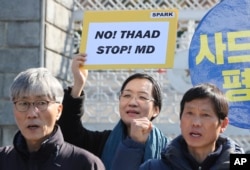A senior U.S. diplomat said Tuesday that China's objections to deployment of a controversial U.S. missile defense system in South Korea were "unwarranted," and he urged China to redirect its response to "a better use."
The United States has deployed the first elements of its Terminal High Altitude Area Defense (THAAD) missile defense system in South Korea, following North Korea's launch of at least four ballistic missiles Monday.
Beijing strongly opposed deployment of the advanced U.S. weapons system as an unnecessary and provocative military escalation, and it said the powerful radar the system uses to track incoming missiles also posed a potential threat to China. State media called for a boycott of South Korean goods and sanctions after the Korean conglomerate Lotte Group approved a land swap that paved the way for the THAAD deployment.
"We think China's objections, if in fact they are based on China's security concerns, are unwarranted," Daniel Russel, outgoing assistant secretary of state for East Asia and Pacific affairs, told a small group of reporters Tuesday evening.
"We would hope that China would devote the energy and the leverage that it is putting into economic pressures against the Republic of Korea to a better use. And we believe that the best use is to persuade North Korea that it is proceeding down a dead end," said Russel, a career foreign service professional who soon will become a diplomat in residence with the Asia Society.
Tillerson to China next week
Russel's roundtable discussion came before Secretary of State Rex Tillerson's planned meeting with Chinese President Xi Jinping next week. North Korea's nuclear and ballistic missile threat will be high on his agenda during his first Asia trip as the top American diplomat.
Tillerson, who will visit Tokyo and Seoul as well as Beijing, is looking at different approaches to address the immediate threat from North Korea, but a direct diplomatic engagement with Pyongyang is off the table.
"We do need to look at other alternatives, and that's part of what this trip is about — that we're going to talk to our allies and partners in the region to try to generate a new approach to North Korea," acting State Department spokesman Mark Toner said Tuesday.
"Given North Korea's recent behavior," Toner told VOA, "we're not at the point where we're looking at direct engagement with them. We're not rewarding that behavior in any way, shape or form."
Toner said the administration "is also intent in pursuing a constructive relationship with China." He said Washington was "determined" to ensure that China abides by international rules and respects fair trade as well as human rights.
Tuesday's news briefing was the first at the State Department since January 19, the day before President Donald Trump's inauguration.





